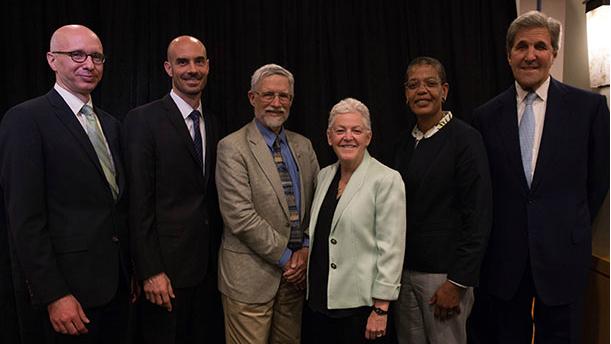Former EPA chief Gina McCarthy launches Center for Climate, Health and the Global Environment at Harvard
From left: Aaron Bernstein, Joseph Allen, John Holdren, Gina McCarthy, Michelle Williams, and John Kerry. All were keynote speakers at the launch of C-CHANGE, the Center for Climate, Health, and the Global Environment at Harvard University.
Recognizing the serious threat climate change poses to public health, the Harvard T.H. Chan School of Public Health recently launched C-CHANGE: Center for Climate, Health, and the Global Environment.
The new center’s director is former EPA Administrator Gina McCarthy. Speakers at a launch event included John Holdren, former science advisor to President Barack Obama; and John Kerry, former US secretary of state and a key architect of the Paris climate agreement.
Pediatrician Ari Bernstein, the co-director of the new center, highlighted the core issues the center plans to tackle.
“The first is the toxification of our planet,” he said. “Pollution of air, fresh water and oceans [are] at unprecedented levels today around the world. The second is climate change, which, despite having been identified as the greatest health threat to humanity in the century, too few people realize its importance to their own health.”
Former Secretary Kerry used the launch to sound an alarm. “To have a president and an EPA director who are not just avoiding the realities of climate, but who are avoiding all sense of responsibility to the future is beyond stunning,” he said. “Lives will be lost.”
Gina McCarthy says that by tackling the health problems related to climate change, C-CHANGE will build on Harvard’s legacy of life-saving research.
“Pollution keeps people down,” she says. “Clean, healthy lives raise people up. It gives them a voice in their own future. That’s what science can do. That’s what our work is going to try to support. … Climate change is the biggest public health challenge that we face, and we want to put a different spin and face on climate change and its connection to public health.
“If you bring climate change down to size, it’s nothing but carbon pollution,” McCarthy continues. “This school has attacked pollution for decades, identified it as a public health problem, helped design solutions. That’s what we need to bring to the table today. Let’s connect the dots. Let’s make it manageable. Let’s not scare people. Let’s actually use this as an investment opportunity. It’s a great twofer. My mother would have loved it.”
The center will work on the full range of public health impacts that the T.H. Chan School looks at — not just air pollution, but also communicable disease, infectious diseases, population issues, green building construction and nutrition. “The whole role of the center is to make that science actionable and bring it to people who can do something with it,” McCarthy says.
The center won’t be dealing in “pie-in-the-sky ideas,” McCarthy insists. Instead, she says, it will focus on, “What do we know? How do we get that information out to the public so they can make choices themselves, and also get it to other decision-makers?”
McCarthy says the center plans to form partnerships with cities that are exploring ways to mitigate climate change and with companies that want to build and work within greener environments. Together, she says, they can provide solutions to climate change that will improve lives and also help build a stronger economy.
“One of the things that was most ingenious about President Obama’s strategy on climate change was that for the first time, climate change was seen as more than just ‘the planet is unhealthy,’” McCarthy says. “It was more than just focusing on polar bears. He really made the case that he needed his entire administration to work together because climate change impacted everything. It impacted our public health, our national security, our economic growth. He saw it as both a challenge and an opportunity. I’m going to keep that attitude.
“I want people to understand that this is not about what’s happening in Washington. It’s about real life, real people, our kids’ future,” she insists. “If we can get that message across, if we can keep optimistic, then I think that we can make some terrific reductions in the kind of pollution that’s impacting our lives today and our future tomorrow.”
This article is based on an interview that aired on PRI’s Living on Earth with Steve Curwood.
